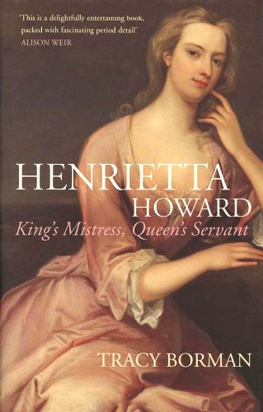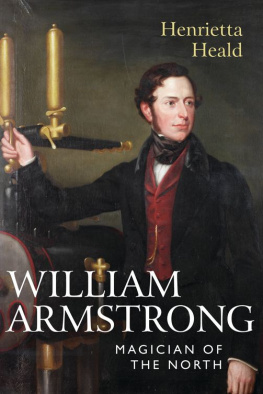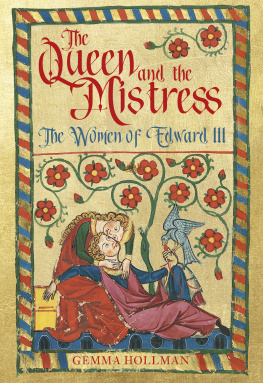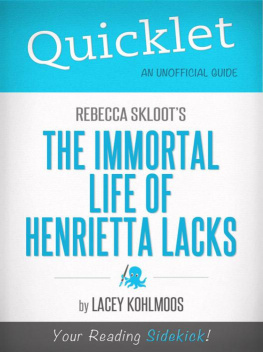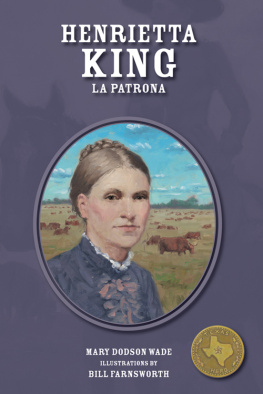This ebook is sold subject to the condition that it shall not, by way of trade or otherwise, be lent, resold, hired out, or otherwise circulated without the publishers prior consent in any form (including any digital form) other than this in which it is published and without a similar condition including this condition being imposed on the subsequent purchaser.
Epub ISBN: 9781446420188
Version 1.0
www.randomhouse.co.uk
Published by Jonathan Cape 2007
2 4 6 8 10 9 7 5 3 1
Copyright Tracy Borman 2007
Tracy Borman has asserted her right under the Copyright, Designs
and Patents Act 1988 to be identified as the author of this work
First published in Great Britain in 2007 by
Jonathan Cape
Random House, 20 Vauxhall Bridge Road,
London SW1V 2SA
www.rbooks.co.uk
Addresses for companies within The Random House Group Limited can be found at:
www.randomhouse.co.uk
The Random House Group Limited Reg. No. 954009
A CIP catalogue record for this book
is available from the British Library
ISBN 978-0-224-07606-7
To Alison, with love and thanks
Acknowledgements
My research has taken me to a wide range of archives, libraries and historic sites, and I have been fortunate to encounter many helpful and supportive people along the way. As well as the staff in the manuscripts room of the British Library and the Norfolk Record Office, I would also like to thank Karen Horn, formerly of the English Heritage Library, whose assiduous hunting down of books from across the country saved me many long hours and contributed enormously to my understanding of the period. Of the various historic sites that I have visited, Marble Hill has featured most prominently; I owe an enormous debt of gratitude to the English Heritage staff there, in particular Jacqui Degnan, Pauline France and Rheme Handhal, for all their help and enthusiasm. Additionally, I would like to thank Cathy Power for sharing her expertise and for organising a display of artefacts at Marble Hill to coincide with publication. Also Wendy Davidson and Lisa Hampton for arranging events and promotion, and my manager, Mark Pemberton. Thanks are due to the staff of Blickling Hall in Norfolk, and to those at Historic Royal Palaces, notably Susanne Groom, Joanna Marschner and David Souden for sharing their expertise on Henriettas apartments and her companions at court.
The Marble Hill Society has, from the very beginning, been incredibly supportive and enthusiastic about the this book. In particular, I am very grateful to Mary Wackerbarth for so generously sharing her wealth of knowledge and research with me. It is thanks to Mary that the date of Henriettas birth, for many years uncertain, was at last discovered. I am also indebted to the Chairman, John Anderson, for so actively garnering support from among the Societys members, and to Keith Hathaway and Janet Clarke for promoting it through guided tours and events.
I wish to thank my publishers, in particular Will Sulkin for having faith in the book and Ellah Allfrey for her insightful and sensitive editorship, and Hannah Ross for her excellent work on publicity. I am also extremely grateful to my agent, Julian Alexander, for his guidance, encouragement and impeccable sense of timing.
I have been very fortunate in having the unstinting support of my family and friends throughout. My biggest thanks go to Alison Weir, without whose generosity and encouragement this book would have remained an idea to be followed up at some undefined point in the future. I would like to thank my parents for their unfailing kindness, patience and support, my sister Jayne and her family, my friends Maura and Howard for being the first to read the manuscript through in its entirety, for coming up with the title, and for promoting the book so energetically. I am also greatly indebted to my dear friend Honor Gay for her boundless enthusiasm and interest in the subject and for her belief in me as an author, to Julian Humphrys for his inspirational finds in second-hand bookshops, to Doreen Cullen for her kindness, wisdom and patience, and to Tony Giardina and all the staff of Il Chicco in New Malden, whose incomparable cappuccinos have sustained me through many a difficult chapter.
Thanks are also due to all of the other kind and generous people who have given their support to this book in various ways, including Sam Hearn and the John Hampden Society, the endlessly creative Richard Knight and Mission 21, my website designer, Ian Robinson, Lucinda and Stuart Eggleton, Philippa Treavett, Richard Foreman, Kathleen Carroll and Len Clark.
Finally to Pete, for his love and support, and for making Twickenham as special to me as it was to Henrietta.
Contents
Prologue
H IDDEN AWAY AMONG THE archives of Lambeth Palace, the ancient residence of the Archbishops of Canterbury, is a collection of letters from the eighteenth century. The volume itself is relatively nondescript, but inside the front cover is a lock of hair. This is dark brown, almost chestnut in colour, and the years have not faded its lustre. It has apparently no connection with the letters contained within; the only clue to its provenance is given in the inscription beneath, which reads: Lady Suffolks hair.
Henrietta Howard, later Countess of Suffolk, was the mistress of King George II. Described variously as the Swiss (because of her apparent neutrality), the Cloe of Popes poem who was so very reasonable, so unmovd, and by Swift as a consummate courtier who packed away her private virtues... like cloaths in a chest, she remains as much an enigma today as she was for her contemporaries. The impression of passivity and mildness that she conveyed belied a complex and fascinating character.
Henrietta was in fact far more than the mistress of a king. She was a dedicated patron of the arts; a lively and talented intellectual in her own right; a victim of violence and adultery; and a passionate advocate for the rights of women before the dawn of feminism. Her wit and intelligence shone through in a society that still viewed any evidence of learning in women as unseemly. Her attacks on the injustice of marriage found expression in the letters she left behind, but more importantly in the actions that shocked her contemporaries and echoed the views that only started to gain ground with the Bluestocking movement a generation later. Henrietta was a woman of reason in an Age of Reason. The mark that she left on the society and culture of early Georgian England was to resonate well beyond the confines of the court, and is still in evidence today.
Traces of Henriettas remarkable life can be found in a host of different places: from the archives at Lambeth to her exquisite Thames-side villa, and from the verses and works of art that she inspired to above all the lively, witty and often scandalous letters of her voluminous correspondence. The latter lay neglected among the Hobart family papers until the nineteenth century, when they were discovered by a Victorian antiquary and passed to the British Library as being of sufficient interest for the nation to enjoy. It is these letters, more than any of the other historical sources, that provided the inspiration for my book. They give a fascinating insight into the glittering world of Georgian high society its poets, playwrights, intellectuals and princes. They capture a forgotten age; an age of cultural enlightenment, high society, immorality and excess, and the gradual demise of monarchical and male predominance. They tell the story of a nation through the lens of a remarkable woman.
When all of these traces of Henriettas past the letters, memoirs, poetry and buildings are pieced together, they reveal a life that was captivating as much for the dramatic events that it contained as for the character of the woman who lived it.

